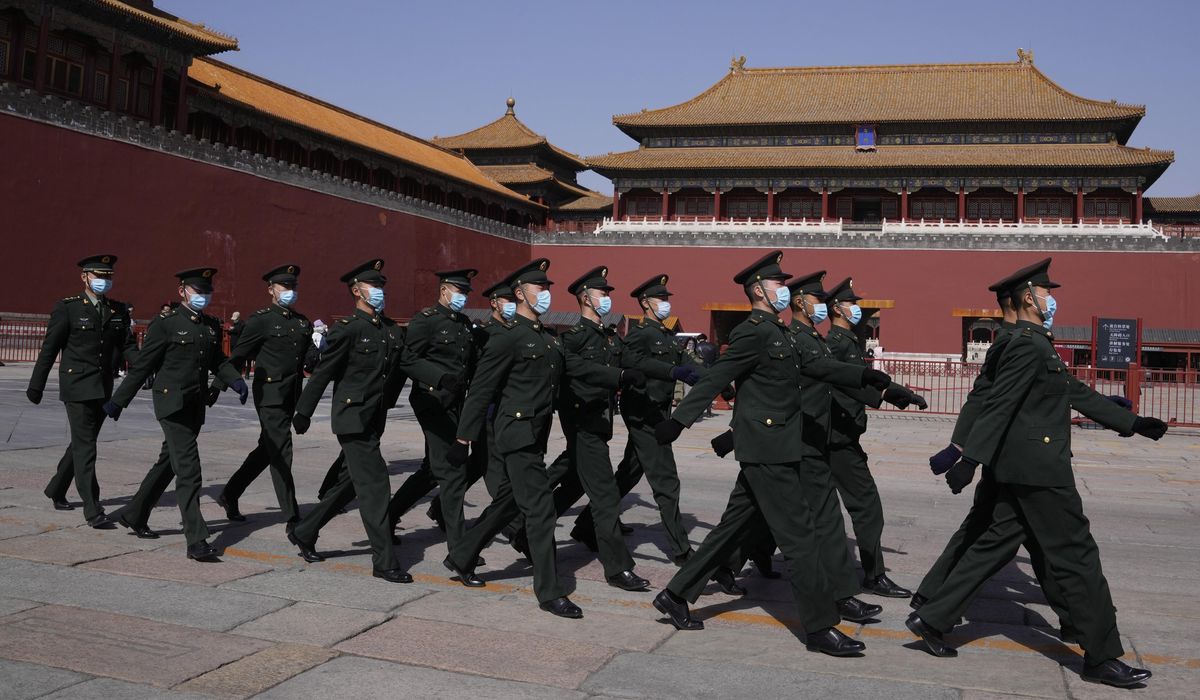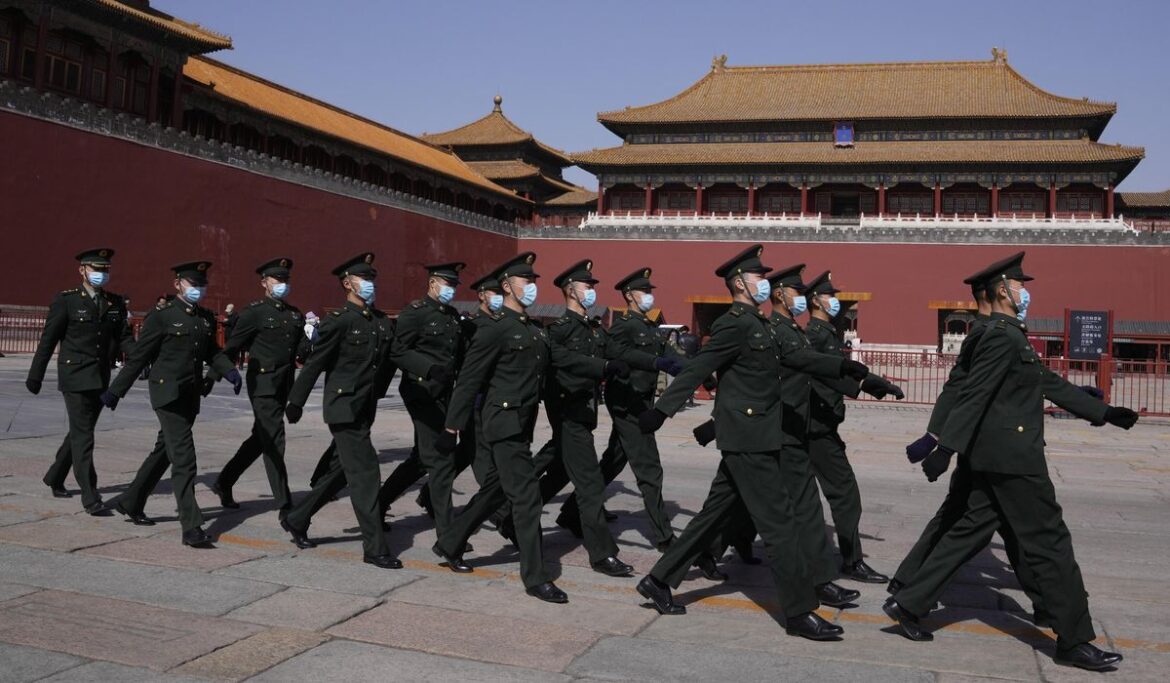
The danger of China conducting a major military attack on Taiwan has increased in the wake of the Russian invasion of Ukraine, senior military and defense officials told Congress on Wednesday.
The danger, based on China’s growing military power, is greater than at any time in recent years, Ely Ratner, assistant defense secretary for Indo-Pacific security affairs, told the House Armed Services Committee.
“I think there is a mounting threat of aggression from the PRC,” said Mr. Ratner, as U.S. officials assess Chinese President Xi Jinping is conducting a major buildup of military forces to prepare for an attack on Taiwan, which he has vowed to reclaim for the mainland.
“His capabilities are growing and his patience seems to be decreasing,” Mr. Ratner said.
The Pentagon is already working with Taiwan on one lesson from Ukraine — the need to develop stronger defense capabilities and the need for closer coordination with states in the region.
International unity in response to the Ukraine crisis is “an important signal to a potential aggressor in the Pacific,” Mr. Ratner said.
And while the threat of a Chinese invasion has increased since Russia‘s Feb. 24 invasion, punishing economic sanctions that have been imposed on the Kremlin for its aggression also could help deter China from attacking Taiwan, he added.
Adm. John Aquilino, commander of the Indo-Pacific Command, said the Russian invasion was “a real wake-up [call]” for the United States and Europe.
“No. 1, we have to look at this and say ‘Hey, this could happen,’” he said. “And I have a sense of urgency to execute the mission, as the secretary [of defense] has assigned, which is to prevent this conflict.”
To deter a Chinese attack, the Pentagon is building up forces and moving them closer to China, he said. A stronger U.S. military posture and greater efforts to assist Taiwan’s defenses are two key elements of the strategy.
Taiwan also is bolstering its reserve forces outside the uniformed armed services, forces that can provide fighting capabilities similar to the volunteers effectively battling Russians in Ukraine, he noted.
“I can’t tell you at this point what the PRC has learned from watching the European issue,” Adm. Aquilino said, using the acronym of People’s Republic of China.”
“What I would say is I think I’m seeing the right lessons that we’d like to learn,” he said. “No. 1, the investment of blood in order to prosecute this illegal event. Second, the international condemnation and the unwillingness to accept it. And third, the drastic economic impacts to the people. Those are the right lessons should this switch over to the Indo-Pacific region.”
House Armed Services Committee Chairman Adam Smith said recent belligerent statements about Taiwan from the Chinese government are “very, very dangerous.”
“We could easily see a China–Taiwan situation in the same way we now see Russia-Ukraine situation,” the Washington state Democrat said.
Chinese Foreign Minister Wang Yi said earlier this week that efforts by the United States to promote Taiwan‘s independence will “push Taiwan to a dangerous situation” and “bring unbearable consequences to the U.S. side.”
Adm. Aquilino said China is “increasing its aggression” toward Taiwan and other states, citing a recent border clash with India, a security crackdown in Hong Kong and the jailing of 1 million mostly Muslim residents of Xinjiang in western China.
Taiwan also has recognized the need to bolster its defenses and recently purchased 100 U.S. Harpoon anti-ship missiles that may not be delivered until 2025.
“The focus there is we need to get them there quickly,” Adm. Aquilino said.
Asked about delays in getting weaponry to Taiwan to deter China, Mr. Ratner said, “We’re currently in the process of evaluating all tools and authorities possible to expedite the provision of the necessary asymmetric capabilities to Taiwan, precisely to reinforce the kind of deterrent you are talking about.”
In his prepared statement for the hearing, Adm. Aquilino said eventually retaking Taiwan remains a high priority for Beijing: “PLA forces have long exercised in areas around Taiwan, but the scale and sophistication of this training has drastically increased,” he stated.
But the admiral appeared to back off a warning made in a congressional hearing a year ago that China could be ready to move against Taiwan in less than six years. His predecessor at the Indo-Pacific Command, Adm. Philip Davidson, had said China could strike Taiwan by 2027.
Chinese military forces in 2021 stepped up coercive activities, including flights into Taiwan’s air defense zone and amphibious assault training near the island.
“While the PRC claims to still prefer a peaceful resolution of cross-strait differences, it has never relinquished use of force as an option,” the admiral said.
China also is continuing an alarming military build-up that includes advanced weapons and capabilities for land, sea, air, space and cyberspace warfare.
“The [People’s Liberation Army] is developing capabilities to project power outside of the PRC’s immediate periphery,” he said. “Xi Jinping has publicly directed the PLA to complete most elements of military modernization by 2027, and they continue to execute the most extensive military build-up since World War II.”
China‘s navy is currently the world’s largest with around 350 warships and submarines, including 130 major surface combat vessels. Beijing plans to have a fleet of 420 warships in the next three years.
China also recently deployed a new J-20 fighter that will add to the power of what the admiral called the largest aviation force in the Indo-Pacific region.
“In addition to an extensive arsenal of advanced ballistic missiles, the PLA Rocket Force is pursuing land-attack, supersonic cruise missiles and other advanced weapons,” he said.
Russia also has increased military operations in the Pacific as a result of the Ukraine conflict.
Before the Feb. 24 operation began, Russian forces in the Far East “pushed out 20 ships and submarines as we can count, they placed them in defensive positions,” Adm. Aquilino said. “They postured other forces to be able to defend their eastern flank. So we absolutely have seen a change and we continue to monitor those like we do every day.”





